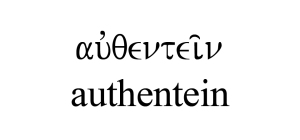In 1972 I had the opportunity to hear Katherine Kuhlman speak in Portland, Oregon. Near the end of the meeting, she addressed criticism from those who did not believe women should preach. By that time in my life, I had already heard numerous women preachers, but that night was the first time I remember anyone saying God had forbidden them. I wondered how God could bless those women in ministry, as I had seen him do, if he was really opposed to them. Since I enrolled the following year in a college founded by a woman preacher—Aimee Semple McPherson—this question had particular relevance to my immediate future.
The opposition to women preaching is primarily based on 1 Timothy 2:11-15, especially verse 12: “I do not permit a woman to teach or to have authority over a man.” (1 Corinthians 14:33-35 is also part of the discussion, but I will reserve that for another time.) This translation hangs precariously on a single Greek word with a remarkably obscure meaning. The word is authentein.
Authentein is usually translated “to bear power over” or “usurp authority.” It appears only once in the Bible, though it can be found in numerous places in other ancient literature. There are four basic meanings to this word:
1: to start something, or to be primarily responsible. In this respect, the word was commonly used in relation to murder. An authentes was a murderer.
2: to dominate or rule over.
3: to usurp power or rights. This application appeared frequently in court documents.
4: to claim ownership or authorship.
Clearly the translation, “I do not permit a woman to teach,” is valid within these meanings, but there are other possibilities. The reference to murder is plausible. Timothy ministered in the city of Ephesus, home of the world famous temple of Artemis, attended by a thousand female devotees and a band of emasculated eunuch priests. Legend also said that Ephesus was founded by the Amazons and the symbolic murder of men was an integral part of some of the pagan ritual of Artemis and other goddesses worshiped in the city. Paul’s statement may have been directed at those practices. If so, then his goal was not to keep women from preaching, but to correct attitudes brought into the church by converts from pagan worship.
Though it has been the most popular, the second meaning, to dominate, seems unlikely in view of other references in Paul’s letters. He spoke often of women in positions of authority, such as Priscilla and Phoebe. Most notable was Junias, who is called an apostle (Romans 16:7). Besides, if he simply wanted to say that women should not exercise authority, he would have done better to use either the word kurieuein or exousiazein.
The idea of women usurping authority that doesn’t belong to them is plausible. The focus would then be on the aggressive pursuit of authority in contrast to quiet learning, something not limited to women. Paul frequently said the same thing to men (such as in verse 8).
The fourth meaning, to claim authorship, provides some interesting possibilities not usually considered in this discussion. The idea of origin is inherent in all definitions of the word. A murderer, for example, is the author or originator of a murder. The English words “author” and “authentic” derive from the same root. The question here is how this relates to women teaching.
Without making it overly complicated, the structure of the entire sentence is common throughout Paul’s letters when he speaks of teaching. Two things are linked together in a way that uses the second to clarify or explain the first. This would translate something like, “I do not allow women to teach a particular doctrine, specifically I don’t allow them to teach authentein.
That means that Paul did not say that women should not teach at all, but rather that they should not teach whatever is represented by the word authentein. The next couple of verses clarify what he had in mind. He says that Adam was created first, and then Eve, and that women will be preserved through bearing children. Both of these statements were direct contradictions of basic and well-known Gnostic teachings of the time, teachings that were prevalent in Ephesus. Gnostics believed that Eve was created first and gave life to Adam, and that having children was a tie to the material world that would keep you from getting into heaven.
Authentein would then allude to the belief that woman was the originator or author of man. To paraphrase Paul in modern terms, a woman should not teach if the content of her teaching is contrary to biblical truth. Instead, she should quietly learn the truth first.
Of course, Paul also said this to the men of Ephesus, who wasted much time arguing over false doctrines, myths and endless genealogies. Katherine Kuhlman made the statement that she did not believe she was God’s first choice for her ministry, but several men failed to respond to the calling. Based on the likely definition of authentein, I believe she actually was God’s first choice. The problem isn’t with women preaching. It is with people preaching opinions, myths and destructive doctrines—such as, “Women have nothing good to say”—instead of the truth.
(The material in this post was adapted from the book I Suffer Not a Woman by Richard Clark Kroeger and Catherine Clark Kroeger.)


Excellent! I have heard many expositions of this section of Scripture that contradict the traditional translation of this passage, but this makes the most sense by far. It is very consistent with Paul’s other instructions regarding women in Ephesus and not bringing Diana worship into the church. Thanks mucho!
The book that inspired this understanding, I Suffer Not a Woman, is an excellent study on the subject. I highly recommend it. And of course, I have my own book called Chatter in the Sanctuary. Only available through me at the moment. There are two biblical passages that are used to keep women from preaching, 1 Timothy 2:9-15 and 1 Corinthians 14:33-35. They are perhaps the most horribly misunderstood and mis taught passages in the Bible.
I’ve been wondering about this as well!
Appreciate the insights. How does this align with what Paul says in 1 Corinthians 14:34-37? Hard to teach in church if women are not permitted to speak!
An excellent question. When I read 1 Corinthians 14:34-37, the phrase that always jumps out to me is the end of verse 34: “as the Law also says.” I’ve searched for decades not to find where it says that in the law and as yet I have not found a satisfactory answer in any commentary on the subject. About the best that anyone seems to be able to do is guess, generally based on their predisposition for how it should be interpreted. A common position is that expressed by Dr. Wayne Grudem, an outspoken adherent to complementarianism: “Paul is not quoting any specific Old Testament passage, but seems to be referring to the Old Testament generally as ‘the Law,’ probably especially the creation order in Genesis 2, and understanding it as teaching a principle of male leadership among God’s people.” (Wayne Grudem, Countering the Claims of Evangelical Feminism, p. 145) This approach, which is very common, fails to take note of a couple of things. First, Paul made very clear elsewhere in Corinthians that his typical approach to ministry is to enter as much as possible into the culture of his listeners and speak to them in language that they would be inclined to accept rather than argue with. He became all things to all men that by all means he might win some. (1 Corinthians 9:19-23) Secondly, there is no reason to believe the law Paul referred to was the Jewish Law. There were plenty of Roman laws available that his readers would have known quite well. For example, Ulpian: “Women are excluded from all civic and public duties, and so they cannot be judges, hold magistracies, bring legal claims for others, represent others in court, or act as procurators (for others) in lawsuits.” Xenophon wrote that men were designed for outdoor activities and women for those indoors: “The gods with great discernment have coupled together male and female, as they are called, chiefly in order that they may form a perfect partnership in mutual service… For he made the man’s body and mind more capable of enduring cold and heat, and journey’s and campaigns; and therefore imposed on him the outdoor tasks. To the woman, since he has made her body less capable of such endurance, I take it that God has assigned the indoor tasks.” Across the Roman empire, life was divided into public activities and private or domestic activities, and women were greatly restricted by law from participation in public affairs. The Roman jurist named Paul recorded legal restrictions that women could not be appointed as judges. This was “not because they do not possess judgment, but because it is traditional that they do not perform civic duties.” Gaius wrote, “Tutelage is generally a male duty,” and Neratius wrote in Rules of Law that “women cannot be appointed tutors since this is a responsibility of males.” According to John Chrysostom: “Our life is customarily organized into two spheres: public affairs and private matters… To woman is assigned the presidency of the household; to man, all the business of the state, the marketplace, the administration of justice, government, the military, and all other such enterprises… [A woman] cannot express her opinion in a legislative assembly, but she can express it at home.” There are many more allusions in Roman law that women are to be silent in the public sphere. I have not found anything in Jewish Law, either in the Bible or in other rabbinical writing that makes this kind of legal restriction. It looks to me like Paul’s message was that in order to become all things to all people in the Gentile world of Rome, the churches needed to take the laws of Rome seriously as long as they did not require denying Jesus. That meant that women should be silent, as the Roman laws said. His purpose was not to prevent women from speaking (they were allowed earlier in 1 Corinthians to prophesy), but rather to encourage them to keep a good reputation within the culture of the time. This is a different subject from what Paul addressed to Timothy, but not at all incompatible with his comments there.